Tuesday, November 14, 2017
Graybill and Gernsback
Recently I observed that our measurement of total "value" in fact measures the exact opposite. We increase the money supply when a bank makes a loan, NOT when labor creates value. A loan is a destroyer of value. It's no wonder we get confused about "growth". We're measuring it upside down. I also observed that the later Soviet system got it right, increasing the money supply in response to Value Added Tax collections.
Last week ZH republished an article by Umair Haque that made the same point about GDP calculations.
 was meant to measure
was meant to measure
 Now that we are measuring THINGS THAT ARE DESTROYED, we should call it the Gross National Destruct.
Haque went on to make a STRONG point:
Now that we are measuring THINGS THAT ARE DESTROYED, we should call it the Gross National Destruct.
Haque went on to make a STRONG point:
 Featured in the above 1928 mag, an early courseware device! Details weren't given, but I'd guess from the visible mechanism that it contained a cylinder-type phonograph geared to a paper 'filmstrip'. The cylinder type (ie Dictaphone) would be especially handy because the teacher could record the lecture directly. Most offices had a dictaphone. Disk recording was expensive and difficult.
Checking ........ Here's the patent on a somewhat later version. It was a disc, not a cylinder, and the controls look fiendishly complex, requiring a fair amount of mechanical skill by the teacher. Arthur Runyan (not Runyon) intended it to be used in language learning, where the sound of a word or sentence would be repeated along with a projected picture of the word. Shoulda gone with a Dictaphone, Artie.
Featured in the above 1928 mag, an early courseware device! Details weren't given, but I'd guess from the visible mechanism that it contained a cylinder-type phonograph geared to a paper 'filmstrip'. The cylinder type (ie Dictaphone) would be especially handy because the teacher could record the lecture directly. Most offices had a dictaphone. Disk recording was expensive and difficult.
Checking ........ Here's the patent on a somewhat later version. It was a disc, not a cylinder, and the controls look fiendishly complex, requiring a fair amount of mechanical skill by the teacher. Arthur Runyan (not Runyon) intended it to be used in language learning, where the sound of a word or sentence would be repeated along with a projected picture of the word. Shoulda gone with a Dictaphone, Artie.
When, in the 1930s, the great economist Simon Kuznets created GDP, he deliberately left two industries out of this then novel, revolutionary idea of a national income: finance and advertising. Kuznets's logic was simple, and it was not mere opinion, but analytical fact: finance and advertising don’t create new value, they only allocate, or distribute existing value, in the same way that a loan to buy a television isn't the television, or an ad for healthcare isn't healthcare. If we do what Kuznets originally suggested, and subtract finance and advertising from GDP, what does that picture reveal? Well, since the lion’s share of growth, more than 50% every year, comes from finance and advertising - whether via Facebook or Google or Wall St and hedge funds and so on - we would immediately see that the economic "growth" that the US has chased so desperately, so furiously, never actually existed at all. And yet, the economy appears to be growing, because purely allocative and distributive enterprises like Uber, Facebook, credit rating agencies, endless nameless hedge funds, shady personal info brokers, and so on, which fail to contribute positively to human life in any discernible way whatsoever, are all counted as beneficial. Do you see the absurdity of it?Makes sense. The Gross National
 was meant to measure
was meant to measure
 Now that we are measuring THINGS THAT ARE DESTROYED, we should call it the Gross National Destruct.
Haque went on to make a STRONG point:
Now that we are measuring THINGS THAT ARE DESTROYED, we should call it the Gross National Destruct.
Haque went on to make a STRONG point:
Now let us go one step, then two steps, further. Finance and advertising are no longer merely allocative industries today. They are now extractive industries. That is, they internalize value from society, and shift costs onto society, all the while, creating no value themselves. The story is easiest to understand via Facebook’s example: it makes its users sadder, lonelier, and unhappier, and also corrodes democracy in spectacular and catastrophic ways. There is not a single upside of any kind that is discernible — and yet, all the above is counted as a benefit, not a cost, in national income, so the economy can thus grow, even while a society of miserable people are being manipulated by foreign actors into destroying their own democracy. Pretty neat, huh?Here he's talking about souls and culture and life, not just GDP. What's the opposite of Facebook? The good is only, to the limited extent that we can see it ... whether life is flourishing, growing, and developing, or not. YES. Needless to say, Marx and Emerson and Graybill saw this coming 150 years ago, but they didn't imagine how FAR it would go before it collapsed. Nature put an unimaginably infinite amount of work into making life. Life has a DUTY to Nature. Our GOD-ASSIGNED DUTY is to make more life, more value, more order. Each creature has limits and abilities and obstacles and opportunities. We can't change those constants, but we MUST make the best of the constants. = = = = = This isn't new, of course. You can see it nicely in some of Gernsback's magazines from the 1920s. The articles and the advertisements are directly opposing vectors. The ads, aimed at the type of guy who experiments with radio, are designed to make you feel even more lonely and even more unpopular. They offer false hope that you can Get The Gal or Impress Your Buddies by Using The Product. The articles are a mix of serious experiments, handy tricks for improving your house or car, and speculative science. If you respond to the ads you will still be unpopular and unloved, and you'll have less money and less gumption for your GOD-ASSIGNED DUTY. If you continue in this direction, your final destination is a bridge. If you respond to the articles you will build things that improve your life, and you will learn things that will help you to perform your job or gain a better job. You will still be unpopular and unloved, but it won't matter nearly as much because you'll have the intrinsic GOD-DESIGNED PLEASURE that comes from doing your GOD-ASSIGNED DUTY. Your life and surroundings and work will constantly improve. MAKE OR BREAK. = = = = = Irrelevant sidenote:
 Featured in the above 1928 mag, an early courseware device! Details weren't given, but I'd guess from the visible mechanism that it contained a cylinder-type phonograph geared to a paper 'filmstrip'. The cylinder type (ie Dictaphone) would be especially handy because the teacher could record the lecture directly. Most offices had a dictaphone. Disk recording was expensive and difficult.
Checking ........ Here's the patent on a somewhat later version. It was a disc, not a cylinder, and the controls look fiendishly complex, requiring a fair amount of mechanical skill by the teacher. Arthur Runyan (not Runyon) intended it to be used in language learning, where the sound of a word or sentence would be repeated along with a projected picture of the word. Shoulda gone with a Dictaphone, Artie.
Featured in the above 1928 mag, an early courseware device! Details weren't given, but I'd guess from the visible mechanism that it contained a cylinder-type phonograph geared to a paper 'filmstrip'. The cylinder type (ie Dictaphone) would be especially handy because the teacher could record the lecture directly. Most offices had a dictaphone. Disk recording was expensive and difficult.
Checking ........ Here's the patent on a somewhat later version. It was a disc, not a cylinder, and the controls look fiendishly complex, requiring a fair amount of mechanical skill by the teacher. Arthur Runyan (not Runyon) intended it to be used in language learning, where the sound of a word or sentence would be repeated along with a projected picture of the word. Shoulda gone with a Dictaphone, Artie.Labels: Make or break, skill-estate
